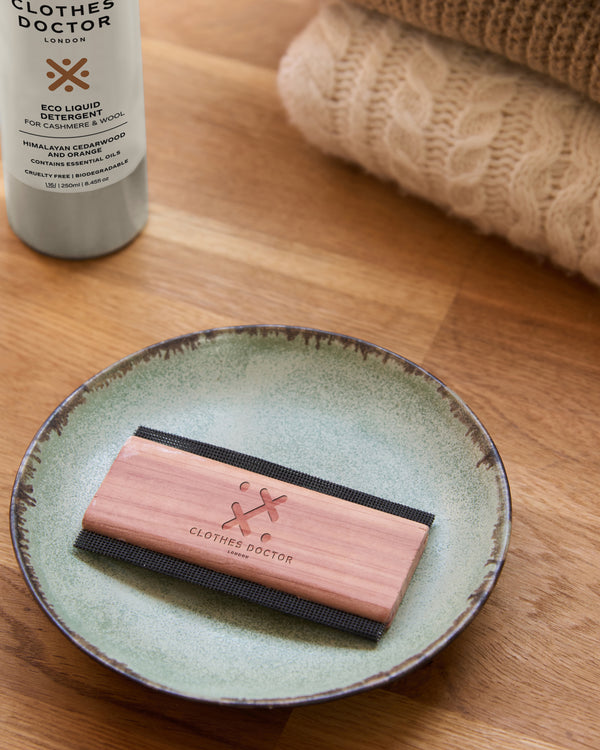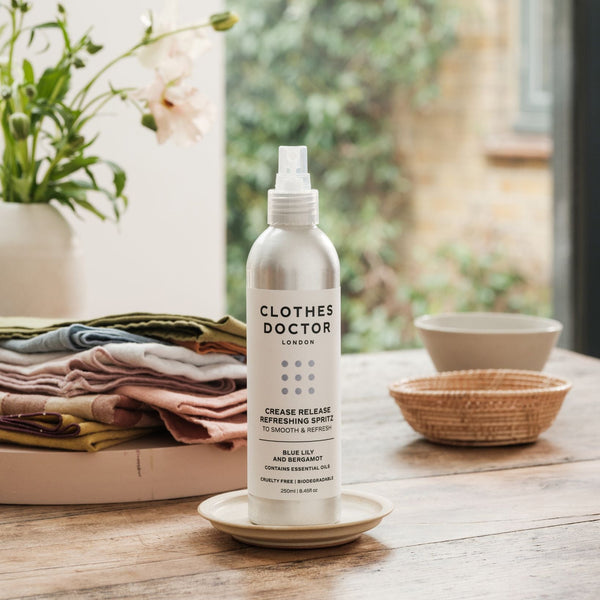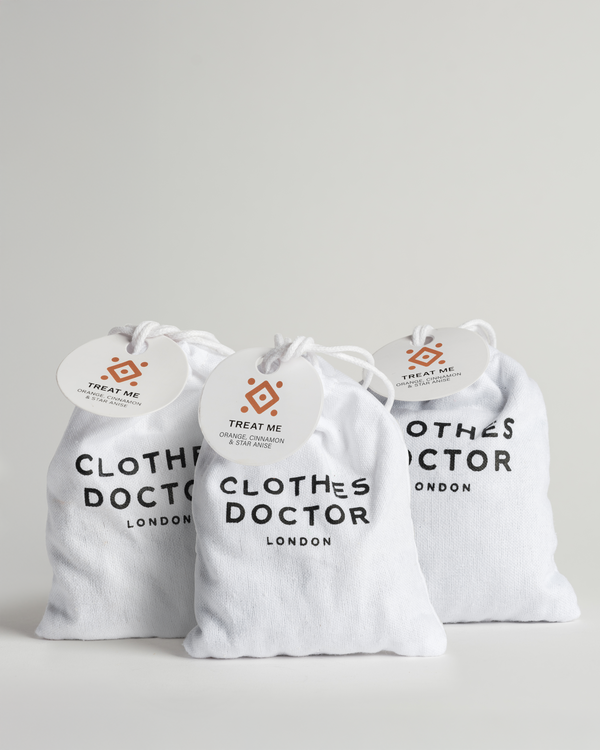The fashion industry is damaging the planet in many ways, and one of the most significant of these is due to how we care for our clothing after we've bought it. These days it's so easy to bung everything in the washing machine, with many households doing daily or even twice daily washes. But the energy and water use, combined with the release of fibres from over-washing can be very damaging. According to research by Plymouth University, washing just 6kg of clothes can release anywhere between 137,951 microfibres for polyester-cotton and 728,789 for acrylic clothing. (Ref)
The truth is that many fabrics really don't need constant washing, and some are actually better off washed as infrequently as possible. That being said, hoarding dirty clothes can cause bacteria to spread and ultimately invite clothes moths to live in your wardrobe. So what can you do to keep your clothes in good condition whilst minimising the environmental damage caused?
Keep reading to learn the truth about how often you really need to wash each type of fabric.
DENIM

We begin with perhaps the most durable of fabrics found in any wardrobe: denim. Used for jeans, shorts, shirts, jackets and accessories, denim is constructed with a twill weave, which makes it both versatile and hard wearing. Washing will fade the colour over time and cause the fabric to thin, so we recommend washing denim as little as possible to keep it in good nick. If you're one of those people who likes to wash their jeans to shrink them back into shape, then try steaming them instead. This should do the trick and will protect the fabric long term.
Recommended Wash Frequency
Once per month for your everyday jeans
Our Top Tip
If your denim is in desperate need of a refresh, we recommend turning the garment inside out and adding plenty of softener to prevent the fabric from stiffening. Try our lovely Basil and Mandarin Leaf Fabric Softener for a eco-friendly option that is free from micro-plastics. You can also wash your denim at a lower temperature to reduce the chance of colour fading (and also the amount of power used by the washing machine).
SYNTHETIC FIBRES
Synthetic fabrics are part of our everyday wardrobe. They include polyester, nylon, acrylic, and the rayon group (including viscose), and are often blended with natural and other synthetic fabrics. The good thing about synthetic fabrics is that they tend to react in a similar way to washing and are usually machine washable. However, a great way to reduce your microfibre impact is to steam these between washes, particularly around the armpits and neck area. Steaming kills 96% of bacteria and releases 0 microfibres!
Recommended Wash Frequency
Regularly - every 3-4 wears with steaming in between.
Our Top Tip
Since most synthetic fabrics are actually derived from plastic, they’re unable to withstand high temperatures. We recommend using a synthetic fabric setting on your washing machine or a warm temperature. Rayon needs particular attention when washing as fabrics such as viscose are susceptible to shrinking and typically labelled dry clean only. Light steaming is a great option for rayon to save on the dry cleaning bill. Add a dash of our Cashmere & Wool Eco Wash into the water and freshen things up!
COTTON

Cotton is a natural fibre and is a favourite for a variety of garments: understandably as it's inexpensive to manufacture, and is comfortable to wear. This fabric is also easy to care for, and can be machine washed and tumble dried without issue, but the energy use of tumble drying means we wouldn't recommend this if it can be avoided. And if you do decide to tumble dry, be careful not to over-dry as this can cause shrinking.
Recommended Wash Frequency
Regularly - every 3-4 wears at 30 degrees.
Our Top Tip
If your cotton garments are stained before going in the wash, then rather than use a hot setting which could potentially set the stain, apply some of our Tough Love Stain Remover as a pre-soak before it goes in. You can then wash on a normal heat cycle.
SHOP NOW
LINEN

Linen is another natural fabric and is made from the flax plant. Though some linen garments are labelled dry clean only, the majority are machine-washable. Linen actually gets better after each wash, becoming softer and more absorbent!
Recommended Wash Frequency
Regularly - every 3-4 wears.
Our Top Tip
Linen has a tendency to absorb more water during the washing cycle than other fabrics, so it is best to avoid overfilling the machine to allow the fabric plenty of room. Wrinkling is a common problem with linen fabric, so we recommend turning garments inside out to wash and use a hot iron with a steam setting.
LEATHER/SUEDE

Both leather and suede fabrics are susceptible to dehydration, collect dirt easily, and can be damaged from chemicals or oils in the air, oxidisation and abrasion. When it comes to washing leather, our Sandalwood Leather Balm cleans leather fantastically at the same time as softening and protecting it from damage. For suede, buffing it gently with a suede brush can usually remove many different marks and stains. We'd also advise using a suede protecting spray.
Recommended Wash Frequency
As a general rule, we recommend washing leather or suede garments only once a year.
Our Top Tip
When applying our Sandalwood Leather Balm to your leather garment, use one of our Natural Sponges and move in a circular motion gently across the surface, before buffing gently with our Lint-Free Bamboo Cloth. The result will be amazing!
SHOP NOW
WOOL & CASHMERE

Wool and cashmere are both natural fibres which make soft and insulating garments, from jumpers and cardigans, to socks and hats. These fabrics also have the benefit of being renewable and biodegradable. Wool in particular is naturally breathable and elastic, with moisture-wicking and anti-bacterial qualities. This means that wool does not need cleaning very regularly.
Although in its natural state wool is washable, due to the way the fabric is woven or knitted, it needs to be treated with care to avoid stretching or shrinking. Use a lukewarm or cool hand-wash and some of our No 3 Eco Wash for Cashmere and Wool. It has anti-moth properties as well as being pH neutral to give a very delicate but effective clean, and is naturally fragranced with Himalayan Cedarwood - delicious! When it comes to cleaning cashmere, it’s important to be extra careful due to the delicate fibres. Use cool water for hand washing, and always dry flat on a towel.
Recommended Wash Frequency
Infrequently: less than once per month
Our Top Tip
For washing both wool and cashmere at home, use cool or lukewarm water with a baby shampoo or mild detergent to keep items soft and in top condition. Avoid wringing and dry flat.
If machine washing, you could also use a mesh laundry bag to add protection to your favourite wool or cashmere pieces and prevent snagging. This will also catch any microfibres released during the washing cycle.
SILK

Silk is another natural fibre favourite – it is strong and supple – giving items a luxurious feel. Like wool, silk itself is washable, but the weave used to constructed garments will pucker and tighten when washed. This means that you have to be careful when it comes to washing silk, by hand washing gently in cold water, with a pH neutral detergent like our No 4 Eco Wash for Silk and Delicates.
Recommended Wash Frequency
These are usually quite infrequently worn garments, so washing every 3-4 wears should be adequate.
Our Top Tip
The great thing about silk is that it gives up dirt without a fight. Our gentle detergent will work wonders to clean and refresh the natural fibres. Air drying silk garments after every wear can also keep them fresher for longer. Remember never to tumble dry silk, and instead roll the garment in a towel to squeeze out the moisture and then hang to dry or steam them lightly.
Browse our eco-friendly and plastic free clothing care products and try out some of our recommended techniques. Don't forget to let us know how it goes by sharing on Instagram using #laundryforgood
SHOP NOW













